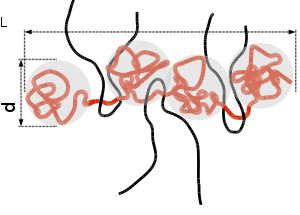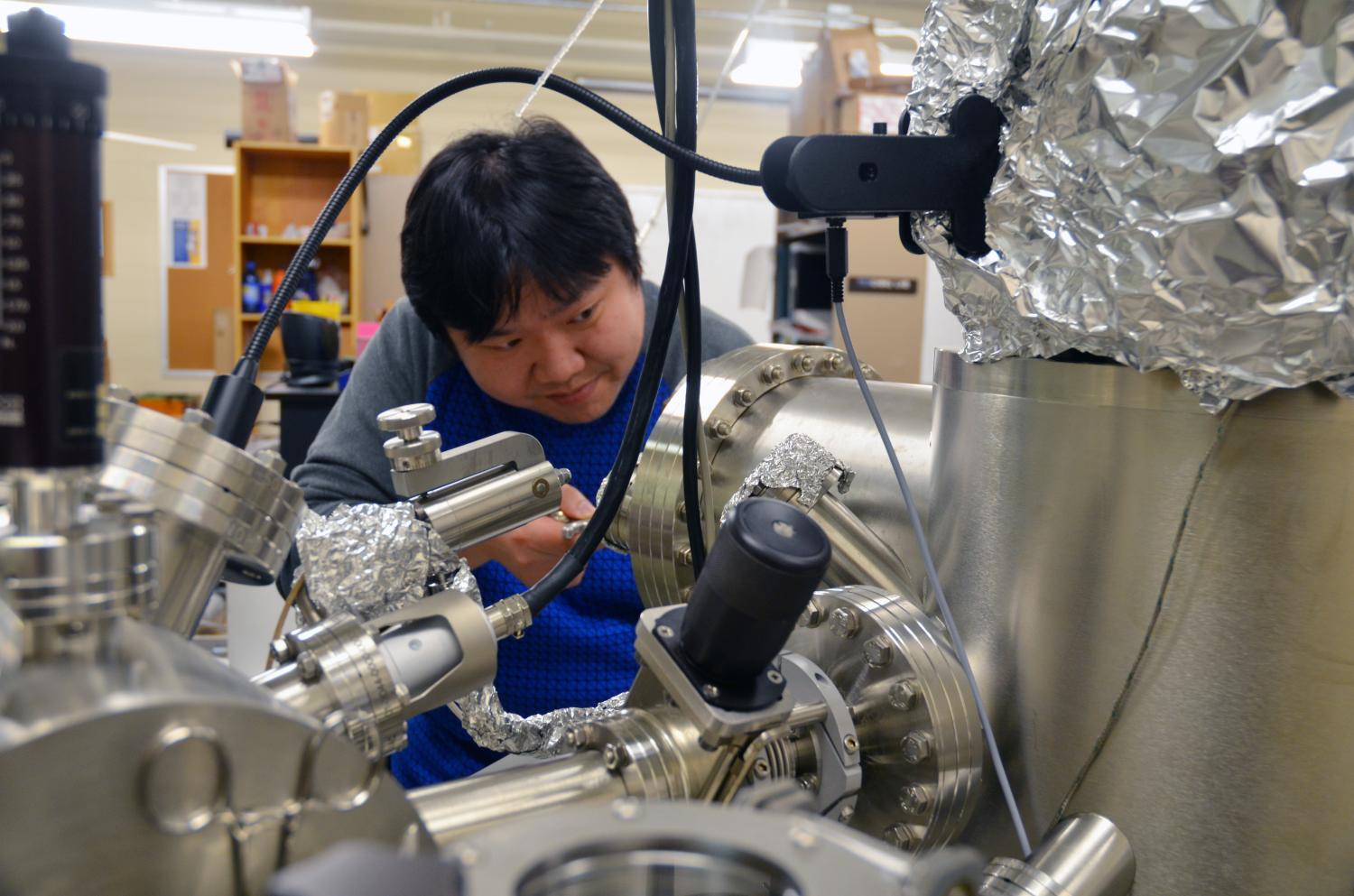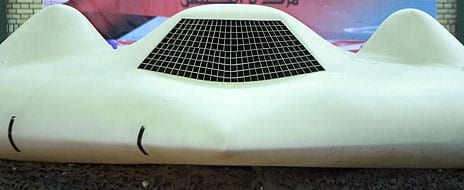
Could one day lead to engineered bio-composites for drug delivery, artificial tissue, bio-sensing, or cancer diagnosis
A team of researchers has uncovered critical information that could help scientists understand how protein polymers interact with other self-assembling biopolymers. The research helps explain naturally occurring nano-material within cells and could one day lead to engineered bio-composites for drug delivery, artificial tissue, bio-sensing, or cancer diagnosis.
Results of this study, “Bionanocomposites: Differential Effects of Cellulose Nanocrystals on Protein Diblock Copolymers,” were recently published in the American Chemical Society’s BioMacromolecules. The findings were the result of a collaborative research project from the Polytechnic Institute of New York University (NYU-Poly) Montclare Lab for Protein Engineering and Molecular Design under the direction of Associate Professor of Chemical and Biomolecular Engineering Jin K. Montclare.
Bionanocomposites provide a singular area of research that incorporates biology, chemistry, materials science, engineering, and nanotechnology. Medical researchers believe they hold particular promise because—unlike the materials that build today’s medical implants, for example—they are biodegradable and biocompatible, not subject to rejection by the body’s immune defenses. As biocomposites rarely exist isolated from other substances in nature, scientists do not yet understand how they interact with other materials such as lipids, nucleic acids, or other organic materials and on a molecular level. This study, which explored the ways in which protein polymers interact with another biopolymer, cellulose, provides the key to better understanding how biocomposite materials would interact with the human body for medical applications.
The materials analyzed were composed of bioengineered protein polymers and cellulose nanocrystals and hold promise for medical applications including non-toxic, targeted drug delivery systems. Such bionanocomposites could also be used as scaffolding for tissue growth, synthetic biomaterials, or an environmentally friendly replacement for petroleum-derived polymers currently in use.
The Latest Google Headlines on:
Hybrid NanoMaterials
[google_news title=”” keyword=”Hybrid NanoMaterials” num_posts=”10″ blurb_length=”0″ show_thumb=”left”]
The Latest Bing News on:
Hybrid NanoMaterials
- Nanomaterials newson May 6, 2024 at 4:59 pm
A team of chemists and bioengineers at Rice University and the University of Houston have achieved a significant milestone in their work to create a biomaterial that can be used to grow biological ...
- So You Want to Buy a Hybrid Car: 6 Things to Knowon May 5, 2024 at 5:00 pm
Maybe a hybrid is a good first step. What do you need to know? You probably know it will save you some gas, if you’re comparing it with a similar non-hybrid (though you probably ought to make sure).
- Best Hybrid SUVs That Cost $35,000 to $45,000on May 1, 2024 at 5:00 pm
Consumers shopping for an SUV would do well by not only considering a hybrid model but also focusing solely on one. That’s because today’s hybrids are more often than not better in nearly ...
- The best hybrid smartwatches you can buy in 2024on April 28, 2024 at 5:00 pm
If you want a device that looks like a traditional timepiece but packs fitness tracking and smartwatch features under the hood, look no further: we’ve rounded up some of the best hybrid ...
- High-energy-density capacitors with 2D nanomaterials could significantly enhance energy storageon April 24, 2024 at 2:22 pm
a nanocomposite expert expect these hybrid capacitors to be used in a broad range of applications in the future and plan to keep working to extend the energy storage capabilities by developing ...
- Every New Hybrid Truck You Can Buy in 2024on April 14, 2024 at 5:00 pm
Hybrid technology may have originally been developed to make econoboxes more economical, but these days adding some electric get-up-and-go to a vehicle can noticeably improve both fuel economy and ...
- Should You Buy a Hybrid Car? Here’s What You Need to Knowon April 11, 2024 at 6:00 am
Just a year ago, the car industry was nearly unanimous in its message: Electric vehicles are the future and will take over the market sooner than you think. Now that optimism seems to have been ...
- 2025 Toyota 4Runner Hybridon April 9, 2024 at 7:19 pm
The new 2025 Toyota 4Runnner marks the arrival of the off-road stalwart’s sixth generation, and for the first time, it offers a hybrid powertrain. While we review the nonhybrid model separately ...
- Why a Plug-In Hybrid May Be the Right Car for Youon April 4, 2024 at 3:40 am
If you are considering plugging into the electric vehicle revolution but worry about the potential hassles and uncertainties of charging on the road, a plug-in hybrid electric vehicle (PHEV ...
- These Are The Best Hybrid-Powered Cars And SUVs For The Money, According To Expertson April 3, 2024 at 1:19 pm
I write about how to maximize your automotive investment and more. The 2024 Toyota Prius hybrid gets an EPA-rated 57 mpg yet remains affordable, starting at well under ... [+] $30,000. For years ...
The Latest Google Headlines on:
Engineered bio-composites
[google_news title=”” keyword=”engineered bio-composites” num_posts=”10″ blurb_length=”0″ show_thumb=”left”]
The Latest Bing News on:
Engineered bio-composites
- Are Composite Biomaterials the Future of Orthopedic Surgery?on May 8, 2024 at 5:00 pm
Composite biomaterials are engineered by combining two or more distinct constituents with complementary properties. This amalgamation results in a final material with superior characteristics compared ...
- Dr. Gayatri Keskar, advanced materials scientist: Networking and collaboration is the key to successon May 8, 2024 at 1:03 am
Gayatri's childhood in an engineering-centric family sparked a fiery love for science and technology, which naturally guided her toward a career in engineering. She began exploring the fascinating ...
- Adicet Bio to Participate in a Fireside Chat at the Citizens JMP Life Sciences Conferenceon May 6, 2024 at 9:00 pm
Adicet Bio, Inc. (Nasdaq: ACET), a clinical stage biotechnology company discovering and developing allogeneic gamma delta T cell therapies for autoimmune diseases and cancer, today announced that Chen ...
- Engineered living materials: Scientists 3D print with bio-ink made from tobacco cellson May 1, 2024 at 5:21 am
Using a 3D printer and a bioink, scientists create an "engineered plant living material" (EPLM) that harnesses the power of cells.
- Bioplastic “Alive” with Bacterial Spores Can Compost Itselfon April 29, 2024 at 5:00 pm
Cells can also be genetically engineered to produce small and large molecules and to display desired functionalities. “Successfully harnessing living cells has limitless potential to develop polymer ...
- JEC World 2024 highlights: Forwarding initiatives surrounding sustainability and mobilityon April 18, 2024 at 5:00 pm
U.S.) to create bio-based carbon fiber composites ... Thermoplastic panel (Composite Technology Center); 3D woven Airbus Wing of Tomorrow rib (Albany Engineered Composites); ASPERA-welded ...
- CETMA is contributing to the development of a completely new composite materialon April 8, 2024 at 5:53 pm
New materials are developed and considered by the industries, in particular materials formulated following eco-design criteria, such as recyclable thermosets or bio-based composites. Even though the ...
- Demo Rain Gardenson June 5, 2022 at 7:41 pm
The rain garden is an unlined bio-filtration basin. The area was amended down to a depth of 18” with an engineered bio-retention media consisting of 70% landscape sand, 15% compost, and 15% native ...
- James Sherwoodon February 17, 2022 at 1:33 pm
(Co-Principal) Facilitating Industry By Engineering, Roadmapping and Science (FIBERS) to Advance (2014), Grant - NIST Sherwood, J.A. (Principal) Fabric Mechanical Characterization Study (2015), ...
- Tissue-Engineered Soft Robot Swims Like A Stingrayon July 7, 2016 at 5:43 pm
Start thinking in terms of optogenetically engineered myocytes, microfabricated gold endoskeletons, and hydrodynamically optimized elastomeric skins, because all of these have now come together in ...










